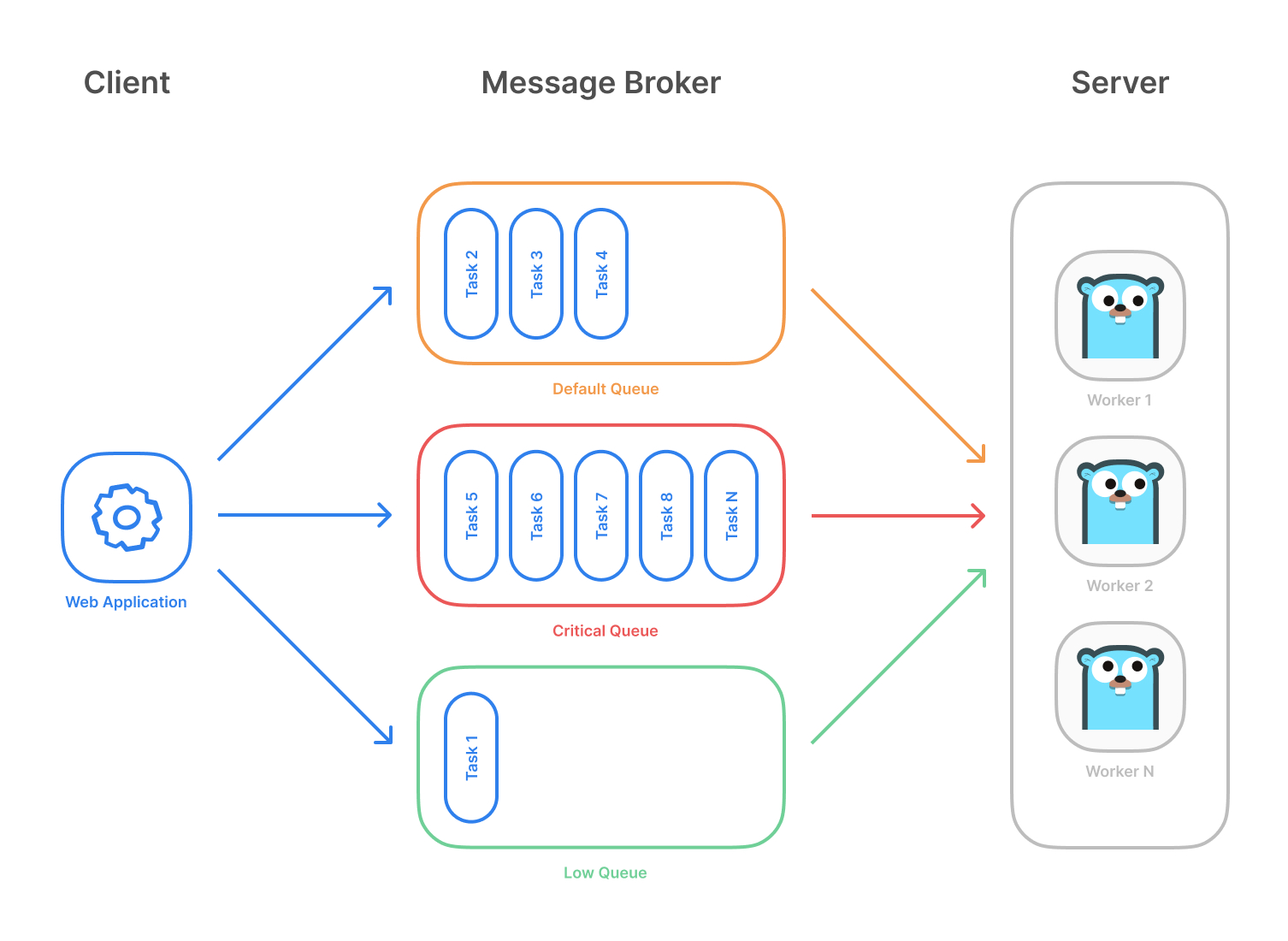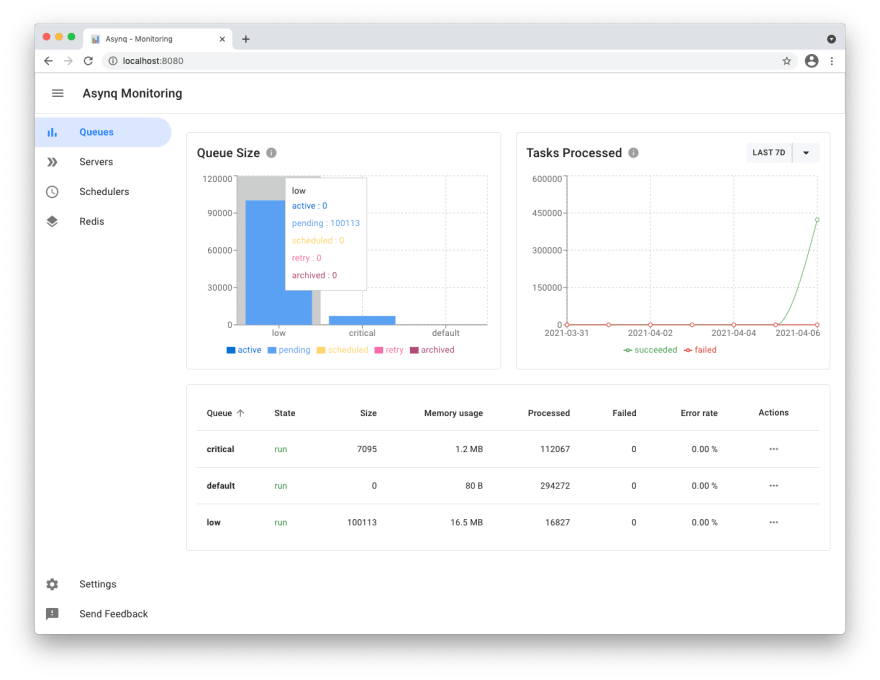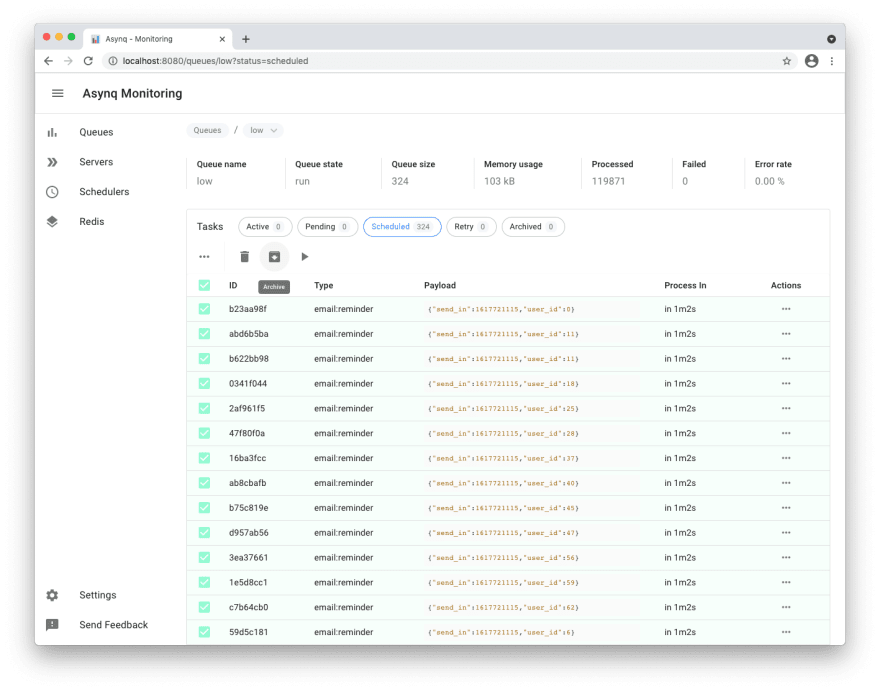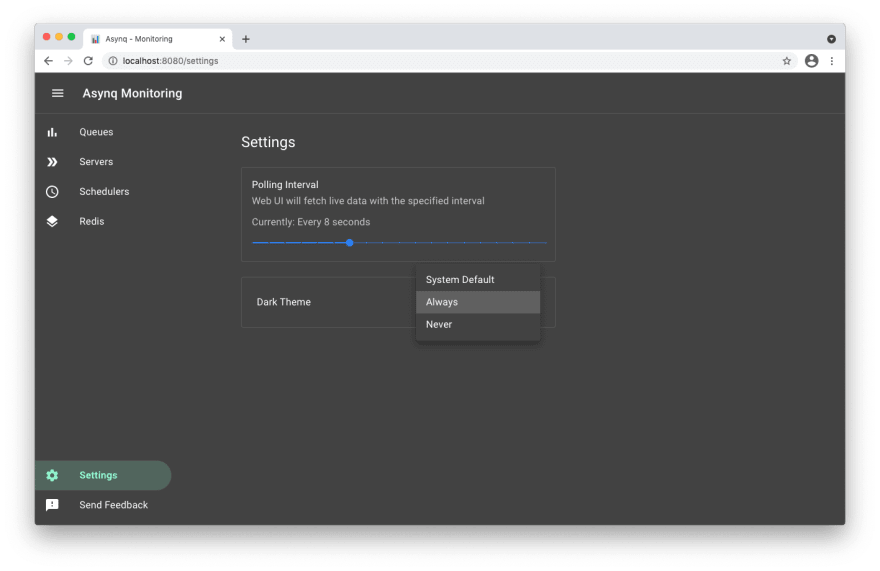AI prompts
base on Simple, reliable, and efficient distributed task queue in Go <img src="https://user-images.githubusercontent.com/11155743/114697792-ffbfa580-9d26-11eb-8e5b-33bef69476dc.png" alt="Asynq logo" width="360px" />
# Simple, reliable & efficient distributed task queue in Go
[](https://godoc.org/github.com/hibiken/asynq)
[](https://goreportcard.com/report/github.com/hibiken/asynq)

[](https://opensource.org/licenses/MIT)
[](https://gitter.im/go-asynq/community)
Asynq is a Go library for queueing tasks and processing them asynchronously with workers. It's backed by [Redis](https://redis.io/) and is designed to be scalable yet easy to get started.
Highlevel overview of how Asynq works:
- Client puts tasks on a queue
- Server pulls tasks off queues and starts a worker goroutine for each task
- Tasks are processed concurrently by multiple workers
Task queues are used as a mechanism to distribute work across multiple machines. A system can consist of multiple worker servers and brokers, giving way to high availability and horizontal scaling.
**Example use case**

## Features
- Guaranteed [at least one execution](https://www.cloudcomputingpatterns.org/at_least_once_delivery/) of a task
- Scheduling of tasks
- [Retries](https://github.com/hibiken/asynq/wiki/Task-Retry) of failed tasks
- Automatic recovery of tasks in the event of a worker crash
- [Weighted priority queues](https://github.com/hibiken/asynq/wiki/Queue-Priority#weighted-priority)
- [Strict priority queues](https://github.com/hibiken/asynq/wiki/Queue-Priority#strict-priority)
- Low latency to add a task since writes are fast in Redis
- De-duplication of tasks using [unique option](https://github.com/hibiken/asynq/wiki/Unique-Tasks)
- Allow [timeout and deadline per task](https://github.com/hibiken/asynq/wiki/Task-Timeout-and-Cancelation)
- Allow [aggregating group of tasks](https://github.com/hibiken/asynq/wiki/Task-aggregation) to batch multiple successive operations
- [Flexible handler interface with support for middlewares](https://github.com/hibiken/asynq/wiki/Handler-Deep-Dive)
- [Ability to pause queue](/tools/asynq/README.md#pause) to stop processing tasks from the queue
- [Periodic Tasks](https://github.com/hibiken/asynq/wiki/Periodic-Tasks)
- [Support Redis Sentinels](https://github.com/hibiken/asynq/wiki/Automatic-Failover) for high availability
- Integration with [Prometheus](https://prometheus.io/) to collect and visualize queue metrics
- [Web UI](#web-ui) to inspect and remote-control queues and tasks
- [CLI](#command-line-tool) to inspect and remote-control queues and tasks
## Stability and Compatibility
**Status**: The library relatively stable and is currently undergoing **moderate development** with less frequent breaking API changes.
> ☝️ **Important Note**: Current major version is zero (`v0.x.x`) to accommodate rapid development and fast iteration while getting early feedback from users (_feedback on APIs are appreciated!_). The public API could change without a major version update before `v1.0.0` release.
### Redis Cluster Compatibility
Some of the lua scripts in this library may not be compatible with Redis Cluster.
## Sponsoring
If you are using this package in production, **please consider sponsoring the project to show your support!**
## Quickstart
Make sure you have Go installed ([download](https://golang.org/dl/)). The **last two** Go versions are supported (See https://go.dev/dl).
Initialize your project by creating a folder and then running `go mod init github.com/your/repo` ([learn more](https://blog.golang.org/using-go-modules)) inside the folder. Then install Asynq library with the [`go get`](https://golang.org/cmd/go/#hdr-Add_dependencies_to_current_module_and_install_them) command:
```sh
go get -u github.com/hibiken/asynq
```
Make sure you're running a Redis server locally or from a [Docker](https://hub.docker.com/_/redis) container. Version `4.0` or higher is required.
Next, write a package that encapsulates task creation and task handling.
```go
package tasks
import (
"context"
"encoding/json"
"fmt"
"log"
"time"
"github.com/hibiken/asynq"
)
// A list of task types.
const (
TypeEmailDelivery = "email:deliver"
TypeImageResize = "image:resize"
)
type EmailDeliveryPayload struct {
UserID int
TemplateID string
}
type ImageResizePayload struct {
SourceURL string
}
//----------------------------------------------
// Write a function NewXXXTask to create a task.
// A task consists of a type and a payload.
//----------------------------------------------
func NewEmailDeliveryTask(userID int, tmplID string) (*asynq.Task, error) {
payload, err := json.Marshal(EmailDeliveryPayload{UserID: userID, TemplateID: tmplID})
if err != nil {
return nil, err
}
return asynq.NewTask(TypeEmailDelivery, payload), nil
}
func NewImageResizeTask(src string) (*asynq.Task, error) {
payload, err := json.Marshal(ImageResizePayload{SourceURL: src})
if err != nil {
return nil, err
}
// task options can be passed to NewTask, which can be overridden at enqueue time.
return asynq.NewTask(TypeImageResize, payload, asynq.MaxRetry(5), asynq.Timeout(20 * time.Minute)), nil
}
//---------------------------------------------------------------
// Write a function HandleXXXTask to handle the input task.
// Note that it satisfies the asynq.HandlerFunc interface.
//
// Handler doesn't need to be a function. You can define a type
// that satisfies asynq.Handler interface. See examples below.
//---------------------------------------------------------------
func HandleEmailDeliveryTask(ctx context.Context, t *asynq.Task) error {
var p EmailDeliveryPayload
if err := json.Unmarshal(t.Payload(), &p); err != nil {
return fmt.Errorf("json.Unmarshal failed: %v: %w", err, asynq.SkipRetry)
}
log.Printf("Sending Email to User: user_id=%d, template_id=%s", p.UserID, p.TemplateID)
// Email delivery code ...
return nil
}
// ImageProcessor implements asynq.Handler interface.
type ImageProcessor struct {
// ... fields for struct
}
func (processor *ImageProcessor) ProcessTask(ctx context.Context, t *asynq.Task) error {
var p ImageResizePayload
if err := json.Unmarshal(t.Payload(), &p); err != nil {
return fmt.Errorf("json.Unmarshal failed: %v: %w", err, asynq.SkipRetry)
}
log.Printf("Resizing image: src=%s", p.SourceURL)
// Image resizing code ...
return nil
}
func NewImageProcessor() *ImageProcessor {
return &ImageProcessor{}
}
```
In your application code, import the above package and use [`Client`](https://pkg.go.dev/github.com/hibiken/asynq?tab=doc#Client) to put tasks on queues.
```go
package main
import (
"log"
"time"
"github.com/hibiken/asynq"
"your/app/package/tasks"
)
const redisAddr = "127.0.0.1:6379"
func main() {
client := asynq.NewClient(asynq.RedisClientOpt{Addr: redisAddr})
defer client.Close()
// ------------------------------------------------------
// Example 1: Enqueue task to be processed immediately.
// Use (*Client).Enqueue method.
// ------------------------------------------------------
task, err := tasks.NewEmailDeliveryTask(42, "some:template:id")
if err != nil {
log.Fatalf("could not create task: %v", err)
}
info, err := client.Enqueue(task)
if err != nil {
log.Fatalf("could not enqueue task: %v", err)
}
log.Printf("enqueued task: id=%s queue=%s", info.ID, info.Queue)
// ------------------------------------------------------------
// Example 2: Schedule task to be processed in the future.
// Use ProcessIn or ProcessAt option.
// ------------------------------------------------------------
info, err = client.Enqueue(task, asynq.ProcessIn(24*time.Hour))
if err != nil {
log.Fatalf("could not schedule task: %v", err)
}
log.Printf("enqueued task: id=%s queue=%s", info.ID, info.Queue)
// ----------------------------------------------------------------------------
// Example 3: Set other options to tune task processing behavior.
// Options include MaxRetry, Queue, Timeout, Deadline, Unique etc.
// ----------------------------------------------------------------------------
task, err = tasks.NewImageResizeTask("https://example.com/myassets/image.jpg")
if err != nil {
log.Fatalf("could not create task: %v", err)
}
info, err = client.Enqueue(task, asynq.MaxRetry(10), asynq.Timeout(3 * time.Minute))
if err != nil {
log.Fatalf("could not enqueue task: %v", err)
}
log.Printf("enqueued task: id=%s queue=%s", info.ID, info.Queue)
}
```
Next, start a worker server to process these tasks in the background. To start the background workers, use [`Server`](https://pkg.go.dev/github.com/hibiken/asynq?tab=doc#Server) and provide your [`Handler`](https://pkg.go.dev/github.com/hibiken/asynq?tab=doc#Handler) to process the tasks.
You can optionally use [`ServeMux`](https://pkg.go.dev/github.com/hibiken/asynq?tab=doc#ServeMux) to create a handler, just as you would with [`net/http`](https://golang.org/pkg/net/http/) Handler.
```go
package main
import (
"log"
"github.com/hibiken/asynq"
"your/app/package/tasks"
)
const redisAddr = "127.0.0.1:6379"
func main() {
srv := asynq.NewServer(
asynq.RedisClientOpt{Addr: redisAddr},
asynq.Config{
// Specify how many concurrent workers to use
Concurrency: 10,
// Optionally specify multiple queues with different priority.
Queues: map[string]int{
"critical": 6,
"default": 3,
"low": 1,
},
// See the godoc for other configuration options
},
)
// mux maps a type to a handler
mux := asynq.NewServeMux()
mux.HandleFunc(tasks.TypeEmailDelivery, tasks.HandleEmailDeliveryTask)
mux.Handle(tasks.TypeImageResize, tasks.NewImageProcessor())
// ...register other handlers...
if err := srv.Run(mux); err != nil {
log.Fatalf("could not run server: %v", err)
}
}
```
For a more detailed walk-through of the library, see our [Getting Started](https://github.com/hibiken/asynq/wiki/Getting-Started) guide.
To learn more about `asynq` features and APIs, see the package [godoc](https://godoc.org/github.com/hibiken/asynq).
## Web UI
[Asynqmon](https://github.com/hibiken/asynqmon) is a web based tool for monitoring and administrating Asynq queues and tasks.
Here's a few screenshots of the Web UI:
**Queues view**

**Tasks view**

**Metrics view**
<img width="1532" alt="Screen Shot 2021-12-19 at 4 37 19 PM" src="https://user-images.githubusercontent.com/10953044/146777420-cae6c476-bac6-469c-acce-b2f6584e8707.png">
**Settings and adaptive dark mode**

For details on how to use the tool, refer to the tool's [README](https://github.com/hibiken/asynqmon#readme).
## Command Line Tool
Asynq ships with a command line tool to inspect the state of queues and tasks.
To install the CLI tool, run the following command:
```sh
go install github.com/hibiken/asynq/tools/asynq@latest
```
Here's an example of running the `asynq dash` command:

For details on how to use the tool, refer to the tool's [README](/tools/asynq/README.md).
## Contributing
We are open to, and grateful for, any contributions (GitHub issues/PRs, feedback on [Gitter channel](https://gitter.im/go-asynq/community), etc) made by the community.
Please see the [Contribution Guide](/CONTRIBUTING.md) before contributing.
## License
Copyright (c) 2019-present [Ken Hibino](https://github.com/hibiken) and [Contributors](https://github.com/hibiken/asynq/graphs/contributors). `Asynq` is free and open-source software licensed under the [MIT License](https://github.com/hibiken/asynq/blob/master/LICENSE). Official logo was created by [Vic Shóstak](https://github.com/koddr) and distributed under [Creative Commons](https://creativecommons.org/publicdomain/zero/1.0/) license (CC0 1.0 Universal).
", Assign "at most 3 tags" to the expected json: {"id":"2429","tags":[]} "only from the tags list I provide: [{"id":77,"name":"3d"},{"id":89,"name":"agent"},{"id":17,"name":"ai"},{"id":54,"name":"algorithm"},{"id":24,"name":"api"},{"id":44,"name":"authentication"},{"id":3,"name":"aws"},{"id":27,"name":"backend"},{"id":60,"name":"benchmark"},{"id":72,"name":"best-practices"},{"id":39,"name":"bitcoin"},{"id":37,"name":"blockchain"},{"id":1,"name":"blog"},{"id":45,"name":"bundler"},{"id":58,"name":"cache"},{"id":21,"name":"chat"},{"id":49,"name":"cicd"},{"id":4,"name":"cli"},{"id":64,"name":"cloud-native"},{"id":48,"name":"cms"},{"id":61,"name":"compiler"},{"id":68,"name":"containerization"},{"id":92,"name":"crm"},{"id":34,"name":"data"},{"id":47,"name":"database"},{"id":8,"name":"declarative-gui "},{"id":9,"name":"deploy-tool"},{"id":53,"name":"desktop-app"},{"id":6,"name":"dev-exp-lib"},{"id":59,"name":"dev-tool"},{"id":13,"name":"ecommerce"},{"id":26,"name":"editor"},{"id":66,"name":"emulator"},{"id":62,"name":"filesystem"},{"id":80,"name":"finance"},{"id":15,"name":"firmware"},{"id":73,"name":"for-fun"},{"id":2,"name":"framework"},{"id":11,"name":"frontend"},{"id":22,"name":"game"},{"id":81,"name":"game-engine "},{"id":23,"name":"graphql"},{"id":84,"name":"gui"},{"id":91,"name":"http"},{"id":5,"name":"http-client"},{"id":51,"name":"iac"},{"id":30,"name":"ide"},{"id":78,"name":"iot"},{"id":40,"name":"json"},{"id":83,"name":"julian"},{"id":38,"name":"k8s"},{"id":31,"name":"language"},{"id":10,"name":"learning-resource"},{"id":33,"name":"lib"},{"id":41,"name":"linter"},{"id":28,"name":"lms"},{"id":16,"name":"logging"},{"id":76,"name":"low-code"},{"id":90,"name":"message-queue"},{"id":42,"name":"mobile-app"},{"id":18,"name":"monitoring"},{"id":36,"name":"networking"},{"id":7,"name":"node-version"},{"id":55,"name":"nosql"},{"id":57,"name":"observability"},{"id":46,"name":"orm"},{"id":52,"name":"os"},{"id":14,"name":"parser"},{"id":74,"name":"react"},{"id":82,"name":"real-time"},{"id":56,"name":"robot"},{"id":65,"name":"runtime"},{"id":32,"name":"sdk"},{"id":71,"name":"search"},{"id":63,"name":"secrets"},{"id":25,"name":"security"},{"id":85,"name":"server"},{"id":86,"name":"serverless"},{"id":70,"name":"storage"},{"id":75,"name":"system-design"},{"id":79,"name":"terminal"},{"id":29,"name":"testing"},{"id":12,"name":"ui"},{"id":50,"name":"ux"},{"id":88,"name":"video"},{"id":20,"name":"web-app"},{"id":35,"name":"web-server"},{"id":43,"name":"webassembly"},{"id":69,"name":"workflow"},{"id":87,"name":"yaml"}]" returns me the "expected json"